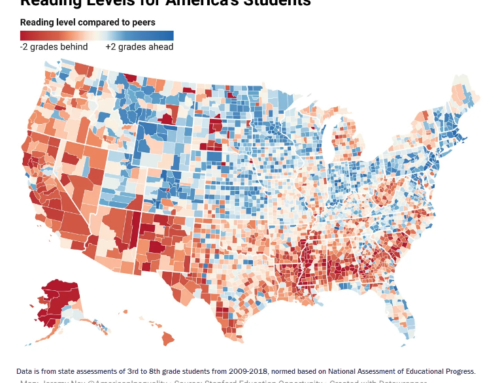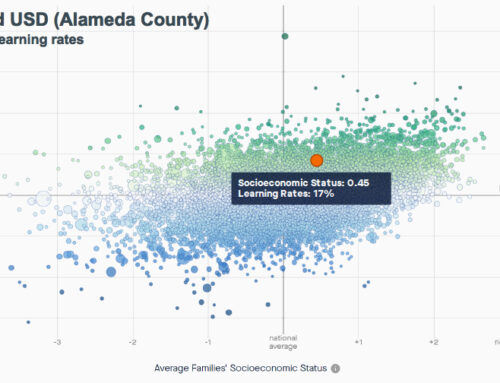Not far from the Capitol Building where legislators make laws, and not far from the CDE’s tower where higher-ups make policy, sits the Legislative Analyst’s Office (LAO). That’s where more than 50 smart and rational souls critique sloppy bills and clumsy policies, with only one concern in mind: whether those bills and policies are best for Californians. They look at unintended consequences. They probe for hidden costs. They question who wins and who loses. They look long-term as well as short-term. They are impartial, since they must serve all elected legislators equally well.
I think of them as champions of rational, reasonable government. In this era, this is a cause that needs champions. When they gather their ideas about K-12 into published form, I pay attention.

Ned Resnikoff, lead author of the LAO’s report, “Narrowing California’s K-12 Student Achievement Gap”
At the end of January, a team at the LAO led by analyst Ned Resnikoff brought out a report, “Narrowing California’s K-12 Student Achievement Gap.” It is one of the few clear-headed, well-reasoned reports on this subject that has come out of the halls of government. (And it is in distinct contrast to the mountain of moralistic sermons on the topic I’ve read.) Plenty of smart research on this topic has come from social scientists like Sean Reardon (Stanford) and Andrew Ho (Harvard). In addition, Paul Warren (Public Policy Institute of California) and Morgan Polikoff (USC Rossier School) have contributed intelligent policy critiques on the topic of California’s achievement gaps. But the LAO’s report points toward legislative and policy recommendations. One of them goes to the heart of the LCAP’s vulnerabilities: no critique of the substance of the plans themselves.
They point to the constraint on county offices of education, which are tasked with reviewing and approving each district’s LCAP. Indeed, the CoE reviews are limited to formalities: is it complete; is there enough money to do what the plan calls for; did the plan “adhere” to the SBE regs on how to spend the funds. (Here’s a link to CCSESA’s LCAP Manual if you want to read more.)
CoEs are not allowed to turn down a district’s LCAP if it misinterprets evidence, misdiagnoses a problem, prescribes a remedy that is sure to fail, or if the cost of the solution is 50 times higher than it should be.
Here’s how the LAO report put it on page 2 of their executive summary, one of just four recommendations. (Italics are mine.)
“Create Standards for Reviewing Districts’ Academic Plans. Currently, the state tasks COEs with reviewing whether districts fill out the LCAP template correctly, but it does not require COEs to do a qualitative review of these plans. Importantly, COEs are not tasked with assessing if districts have ascertained their most pressing performance issues, identified promising strategies for improving their performance, and made budget decisions that are well aligned with their improvement plans. A third legislative option is to convene certain experts to develop a set of LCAP review standards. Based upon a holistic review of districts using the new review standards, COEs could identify poorly performing districts and increase support for them.”
In the body of their report, the authors elaborate:
“Under this option, the Legislature would direct CDE, CCEE, and the COE geographic leads to develop a set of LCAP review standards. For example, COEs could be tasked with examining the link between a district’s identified achievement gaps and its strategies for addressing them. Based upon a holistic review of the district using the new review standards, a COE could assign a qualitative rating to the LCAP—for example, positive, qualified or negative (borrowing terms COEs already use to review district budgets). A poor LCAP rating would trigger more COE support for the district. Such an approach would make COEs’ role in instructional oversight somewhat more analogous to their role in fiscal oversight.”
Though we think this is a promising option for the Legislature to consider, we note that COEs vary in their capacity and expertise to review plans. Nonetheless, especially given new support from geographic COE leads, we think LCAP review standards could make the review process more meaningful. Another perceived disadvantage of this option is that COEs have difficulty balancing their oversight and support functions, but this is a common issue among all entities tasked with management-type functions. Many entities find constructive ways to fulfill both functions.
This makes a great deal of sense. Here’s why. As districts in “differentiated assistance” face the dreaded risk of “intensive intervention” (Level 3), county offices of education face a risk of their own. If those districts don’t get out of Level 3, the county office would have to take control of running the academic side of the district. In effect, the district enters a state of academic insolvency. And the county office would step in to run the show, just as FCMAT steps in when districts declare themselves to be financially unable to meet their obligations.
If CoEs are going to be left holding the bag, they need the authority to help steer districts away from the cliff of academic insolvency. Authority and responsibility should be balanced. Too much of one without the other is an unstable mixture. And right now, county offices of education have too much responsibility and not enough authority. Let’s hope that legislators and the Governor heed this LAO report’s recommendations.






